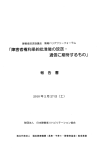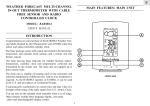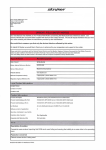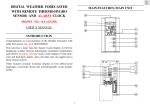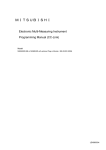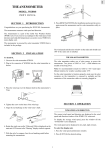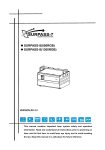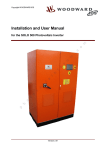Download Oregon Scientific EMR812 Thermometer User Manual
Transcript
GB MULTI-CHANNEL IN-OUT CABLE FREE THERMOMETER MAIN FEATURES: MAIN UNIT MODEL: EMR812 USER’S MANUAL INTRODUCTION Congratulations on your purchase of the EMR812 Multi-Channel In-Out Thermometer with 433MHz cable free sensor. C HA N NE L The EMR812 is an easy-to-use, state-of-the-art thermometer. The basic package comes with a main unit, which is the temperature station, and a remote unit, the thermo sensor. 4 3 3 M H z M EM C A B L E The main unit has extra-large read-outs for indoors temperature and for that collected and transmitted by the remote unit. The main unit can support up to three remote units. The main unit is capable of monitoring temperature changes of remote sites. By setting the upper and lower temperature limits the alarm will activate when those limits are exceeded. Also, the maximum and minimum temperature of different sites can also be retrieved quickly. HI O N /O FF LO T EM P AL °C R ESET No wire installation is required between the main and remote units. As the EMR812 operates at 433MHz, it can be used in the U.S. and most places in Continental Europe. 1 °F C LE A R F R E E GB A EXTRA LARGE TWO - LINE DISPLAY L WALL - MOUNT RECESSED HOLE Facilitates easy reading of remote and indoors temperatures For mounting the main unit on a wall B CHANNEL BUTTON Selects among different channels FEATURES: REMOTE THERMO-HYGRO SENSOR C MEMORY (MEM) BUTTON Recalls the maximum or minimum temperature of individual channels D CLEAR BUTTON Clears the maximum and minimum temperatures of individual channels E HIGH (HI) / LOW (LO) BUTTON Sets the upper or lower temperature alarm limits of individual channels F ADVANCE (s ) BUTTON Sets the readings for the upper or lower temperature of individual channels G TEMPERATURE ALARM (TEMP AL) ON/OFF BUTTON For turning on or off, the temperature alarm of individual channels H RESET BUTTON For returning all settings to default values and erases temperature memories I °C/°F SLIDE SWITCH For selecting between degree Centigrade (°C) and Fahrenheit (°F) J BATTERY COMPARTMENT Accommodates two UM3 or "AA" size alkaline batteries K RETRACTABLE TABLE STAND For standing the main unit on a flat surface 2 GB 3. Initially place both units close together. This will ensure synchronization between the remote unit and the main unit. Then, install batteries for the main unit or reset the main unit. A. TWO-LINE LCD Displays the current temperature and humidity monitored by the remote unit 4. Position the remote unit and main unit within effective transmission range, which, in usual circumstances, is 30 meters. B. LED INDICATOR Flashes when the remote sensor transmits a reading Note : Building materials and where the main and remote units are positioned can vastly affect effective range. Try various set-ups for best result. C. °C/°F SLIDE SWITCH Selects between Centigrade (°C) and Fahrenheit (°F) Though the remote units are weather proof, they should be placed away from direct sunlight, rain or snow. D. CHANNEL SLIDE SWITCH Select the remote sensor Channel 1, Channel 2 or Channel 3 E. RESET BATTERY AND CHANNEL INSTALLATION: REMOTE UNIT Returns all user programmed settings to original factory set values F. BATTERYCOMPARTMENT The remote thermo-hygro sensor unit uses two (2) UM-3 or “AA” size batteries. Accommodates two (2) UM-3 or AA-size batteries G. BATTERY DOOR Follow these steps to install / replace batteries: H. WALL-MOUNT HOLDER 1. Remove the screws on the battery compartment. Supports the remote unit in wall-mounting 2. Select the channel number on the [CHANNEL] slide switch. I. REMOVABLE TABLE STAND 3. Select the temperature display unit on the °C/°F slide switch. For standing the remote unit on a flat surface BEFORE YOU BEGIN For best operation, 1. Assign different channels to different remote units. 2. Insert batteries for remote units before doing so for the main unit. 3 GB 3. Replace the battery compartment door. 4. Insert the batteries strictly according to the polarities shown therein. LOW BATTERY WARNING 5. Replace the battery compartment door and secure its screws. Replace the batteries when the low-battery indicator of the particular channel lights up on the main unit. (Repeat the steps described in section “BEFORE YOU BEGIN”) Replace the batteries when the low-battery indicator of the indoor temperature display lights up. (Repeat the steps described in section "BEFORE YOU BEGIN") Note that once a channel is assigned to a remote unit, you can only change it by removing the batteries or resetting the unit. Respectively, for a remote sensor unit, the low-battery icon will show when the channel is selected. BATTERY INSTALLATION: MAIN UNIT GETTING STARTED The main unit uses two UM3 or "AA" size alkaline batteries. To install them, Once batteries are in place for the remote units, they will start transmitting temperature readings at 30-second intervals. 1. Slide open the battery compartment door. The main unit will also start searching for signals for about a minute once batteries are installed. Upon successful reception, the individual channel temperatures will be displayed on the top line and the indoors temperature on the bottom line. The main unit will automatically update its readings at about 30-second intervals. 2. Insert the batteries strictly according to the polarities shown therein. 4 GB goes blank “ ”, press CHANNEL and MEM to enforce an immediate search. If this fails, check the following. 1. The remote unit of that channel is still in place. 2. The batteries of both the remote unit and main unit and replace as necessary. Note : When the temperature falls befow freezing point, the batteries of outdoor units will freeze, lowering their voltage supply and the effective range. If no signals are received, blanks “ ” will be displayed and the kinetic wave icon will show “ ”. Press CHANNEL and MEM simultaneously to enforce another search for about 30 seconds. This is useful in synchronizing the transmission and reception of the remote and main units. 3. The transmission is within range and the path is clear of obstacles and interference. Shorten the distance when necessary. Repeat this step whenever you find discrepancies between the reading shown on the main unit and that on the respective remote unit. TEMPERATURE TREND The temperature trend indicator on the screen shows the trend of readings collected at that particular remote site. Three trends, rising, steady and falling, will be shown. HOW TO CHECK REMOTE AND INDOORS TEMPERATURES Arrow indicator The indoors temperature is shown on the bottom line of the display. Temperature Trend As for the remote sites or channels, press CHANNEL to go from one channel to another. The kinetic wave display on the channel number indicates the reception of that particular channel is in good order. Rising Steady Falling If the temperature goes above or below than the temperature measuring range of the main unit or the remote unit ( stated in specification), the display will show “HHH” or “LLL”. DISCONNECTED SIGNALS If without obvious resasons the display for a particular channel 5 GB HOW TO READ THE KINETIC WAVE DISPLAY HOW TO USE TEMPERATURE ALARMS The temperature alarms allow you to set the upper and lower limits of readings for individual channels. The alarm will activate if a limit is exceeded. To set the alarm, The kinetic wave display shows the signal receiving status of the main unit. There are three possible forms: 1. Select the channel to be set. 2. Press the HI/LO button for the upper (HI) or lower (LO) limit. An “OFF” message will be displayed if the alarm for that limit is turned off. The unit is in searching mode. Temperature readings securely registered. are 3. Use the ADVANCE ( s ) button to set the upper or lower temperature. No signals. If this is the first time you set the limits, the lower limit will start from -50°C (-58°F) and the upper limit +70°C (158°F). Otherwise, the reading will start from the temperature last selected. MAXIMUM AND MINIMUM TEMPERATURES Each press on the button will increase the temperature by one degree. Holding on the button will step up the increment by five. The maximum and minimum recorded indoor temperatures and those of each channel will be automatically stored in memory. To display them, 4. Press TEMP AL ON/OFF button to switch on or off the Max./ Min. temperature alarm. The set limit will be displayed. 5. Press HI/LO button to set another limit or return to normal display. The respective HI, LO or both indicators will light up to signify the status of the alarm. 1. Select the channel to be checked. 2. Press MEM once to display the maximum temperature and again the minimum temperature. The respective indicators, MAX or MIN will be displayed. When an alarm activates, the display will switch to the respective channel with the display flashing. If undisturbed, it will alarm for one minute. Press any key to momentarily mute the alarm. It will alarm again if the temperature continues to exceed the set limit. To clear the memory, press CLEAR. All segments of the display will light up for two seconds. The display will return to the last screen with maximum and minimum temperature erased from memory. To disable an alarm altogether, select the channel and use TEMP AL ON/OFF to turn it off. If you press MEM now, the maximum and minimum temperatures will have the same values as the current ones until different readings are recorded. If you have set the upper and lower temperatures for more than one 6 GB channel and the limits are exceeded, the alarm will activate with the display switching from one channel to another at five seconds intervals. As for the remote unit, it comes with a wall-mount holder and a removable stand. Use either to hold the unit in place. Main unit Wall-mount Table Stand TRANSMISSION COLLISION Signals from other household devices, such as door bells, home security systems and entry controls, may interfere with those of this product and cause temporarily reception failure. This is normal and does not affect the general performance of the product. The transmission and reception of temperature readings will resume once the interference recedes. Remote unit NOTE ON °C AND °F Wall-mount Table Stand The unit of temperature display is selected on the °C/°F slide switch. Select °C for Centigrade or °F for Fahrenheit. Note : The remote temperature display on the main unit is dominated by the selection on the °C/°F slide switch of the main unit. Whatever the display units of the remote sensors are, they will be automatically converted to the chosen one of the main unit. HOW TO USE THE TABLE STAND OR WALL MOUNTING THE RESET BUTTON The main unit has a retractable table stand, which when flipped open, can support the unit on a flat surface. Or you can flip close the stand and mount the unit on a wall using the recessed screw hole. This button is only used when the unit is operating in an unfavorable way or malfunctioning. Use a blunt stylus to hold down the button. All settings will return to their default values. 7 GB PRECAUTIONS SPECIFICATIONS This product is engineered to give you years of satisfactory service if you handle it carefully. Here are a few precautions: Temperature Measurement Main unit 1. Do not immerse the unit in water. Indoor Temperature measurement 2. Do not clean the unit with abrasive or corrosive materials. They may scratch the plastic parts and corrode the electronic circuit. 3. Do not subject the unit to excessive force, shock, dust, temperature or humidity, which may result in malfunction, shorter electronic life span, damaged battery and distorted parts. 4. Do not tamper with the unit’s internal components. Doing so will invalidate the warranty on the unit and may cause unnecessary damage. The unit contains no user-serviceable parts. Displayed IN temperature range : 14.2°F to 158.0°F (-9.9°C to +70.0°C) Proposed operating range : 23.0°F to 122.0°F (-5.0°C to +50.0°C ) Temperature resolution : 0.2°F (0.1°C) Remote Temperature measurement Displayed OUT temperature range 5. Only use fresh batteries as specified in the user’s manual. Do not mix new and old batteries as the old ones may leak. : -58.0°F to 158.0°F (-50.0°C to +70.0°C) Proposed operating range 6. Always read the user’s manual thoroughly before operating the unit. : 23.0°F to 122.0°F (-5.0°C to +50.0°C) Temperature resolution : 0.2°F (0.1°C) Remote unit 8 Displayed range : -58.0°F to 158.0°F (-50.0°C to +70.0°C) Proposed operating range : -4.0°F to 140.0°F (-20.0°C to +60.0°C) Temperature resolution : 0.2°F (0.1°C) RF Transmission Frequency : 433 MHz No. of Remote unit : Maximum of 3 GB RF Transmission Range : Maximum 100 feet (30 meters) Temperature sensing cycle : around 30 seconds Warning: Changes or modifications to this unit not expressly approved by the party responsible for compliance could void the user’s authority to operate the equipment. FCC : Power Main unit : use 2 pcs UM-3 or “AA” 1.5V alkaline battery Remote sensing unit : use 2 pcs UM-4 or “AAA” 1.5V alkaline battery NOTE: This equipment has been tested and found to comply with the limits for a Class B digital device, pursuant to Part 15 of the FCC Rules. These limits are designed to provide reasonable protection against harmful interference in a residential installation. This equipment generates, uses and can radiate radio frequency energy and, if not installed and used in accordance with the instructions, may cause harmful interference to radio communications. Weight Main unit Remote sensing unit However, there is no guarantee that interference will not occur in a particular installation. If this equipment does cause harmful interference to radio or television reception, which can be determined by turning the equipment off and on, the user is encouraged to try to correct the interference by one or more of the following measures: : 8.82 ounces (250 g) (without batteries) : 3.51ounces(100g) (without batteries) Dimension Main unit Remote sensing unit o Reorient or relocate the receiving antenna. : 4.61x4.21x1.07inches (117 x 107 x 26 mm) : 3.62x2.36x.83 inches (92 x 60 x 21 mm) o Increase the separation between the equipment and receiver. o Connect the equipment into an outlet on a circuit different from that to which the receiver is connected. o Consult the dealer of an experienced radio/TV technician for help. NOTE ON COMPLIANCE Company Name: Oregon Scientific, Inc. This device complies with Part 15 of the FCC Rules. Operation is subject to the following two conditions: (1) This device may not cause harmful interference, and (2) This device must accept any interference received, including interference that may cause undesired operations. Address: 19861 SW 95th Place, Tualatin, Oregon 97062, USA Telephone Number: (1)503-6398883 Name and model number of the product: Digital Weather Forecaster with Remote Thermo-Hygro sensor and Radio Controlled Clock BAR112HGA 9 CAUTION — The content of this manual is subject to change without further notice. — Due to printing limitation, the displays shown in this manual may differ from the actual display. — The manufacturer and its suppliers held no responsibility to you or any other person for any damage expenses, lost profits, or any other claim arise by using this product. — The contents of this manual may not be reproduced without the permission of the manufacturer. CUSTOMER ASSISTANCE Should you require assistance regarding this product and its operation, please contact our customer care department at 800-853-8883 or via email at [email protected]. WARRANTY This product is warranted to be free of manufacturing defects for a period of 3 months from date of retail purchase. Defective product should be directed to the place of retail purchase for exchange. Should this not be possible, contact our customer care department for assistance and a return material authorization. No returns may be made without a return authorization. Please retain your retail receipt as you may be asked to provide a copy of it for proof of date purchased. This warranty does not cover product subjected to abuse, misuse, accidental damage or tampering. MODEL: EMR812 MULTI-CHANNEL IN-OUT CABLE FREE THERMOMETER Instruction Manual **** Mode D'emploi **** Bedienungsanleitung **** Manuale di Istruzioni **** Instrucciones de Funcionamiento











